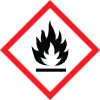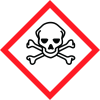Sodium Borohydride
TCI AMERICA
Revision date : 2018-07-06


General Information
Revision date
2018-07-06
Product name
Sodium Borohydride
CAS No.
16940-66-2
Icons in SDS
Company Information
Company name
TCI AMERICA
E-mail address of the competent person responsible for the Safety Data Sheet
sales-US@TCIchemicals.com
GHS Information
Signal word
Danger!
Section 2
SECTION 2: Hazards identification
WHMIS 2015 OSHA Haz Com: CFR 1910.1200: Acute Toxicity - Oral [Category 3] WHMIS 2015: Acute Toxicity - Dermal [Category 3] Acute Toxicity - Inhalation [Category 1] Eye Damage/Irritation [Category 1] Substances and Mixtures which, in Contact with Water, Emit Flammable Gases [Category 1] Skin Corrosion/Irritation [Category 1B]
Signal word
Danger!
Hazard statements
In contact with water releases flammable gases which may ignite spontaneously Fatal if inhaled Toxic if swallowed or in contact with skin Causes severe skin burns and eye damage
Hazard pictograms
or Symbol(s)
Prevention
Do not allow contact with water. Handle under inert gas. Protect from moisture. Do not breathe dust, fume, mist, vapors or spray. Use only outdoors or in a well-ventilated area. Do not eat, drink or smoke when using this product. Wash hands and face thoroughly after handling. Wear respiratory protection. Wear protective gloves, protective clothing, face protection.
Response
If swallowed: Rinse mouth. Do NOT induce vomiting. Immediately call a poison center or doctor. If on skin (or hair): Take off immediately all contaminated clothing. Rinse skin with water or shower. Immediately call a poison center or doctor. Wash contaminated clothing before reuse. If inhaled: Remove person to fresh air and keep comfortable for breathing. Immediately call a poison center or doctor. If in eyes: Rinse cautiously with water for several minutes. Remove contact lenses, if present and easy to do. Continue rinsing. Immediately call a poison center or doctor. Brush off loose particles from skin. Immerse in cool water or wrap with wet bandages. In case of fire: Use dry chemical or dry sand to extinguish.
Storage
Store in a dry place. Store in a closed container. Store in a well-ventilated place. Keep container tightly closed. Store locked up.
Disposal
Dispose of contents and container in accordance with local, regional, national regulations (e.g. US 40 CFR Part 261, EU 91/156/EEC, JP Waste Disposal and Cleaning Act, etc.).
2.3 Other hazards
None. [HNOC]

